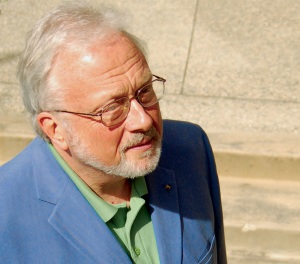William Bolcom – American Masterpieces: Choral Music Tuesday, September 11, 2012
The National Endowment for the Arts’ American Masterpieces: Choral Music initiative is designed to celebrate our national musical heritage by highlighting significant American choral composers and their works of the past 250 years. Stanton’s Sheet Music is proud to present this series highlighting the composers and their works featured in this groundbreaking project.
 (from NEA.gov)
(from NEA.gov)
Composer and pianist William Bolcom (born 1938) is one of the few musicians since George Gershwin to comfortably straddle the divide between popular and classical music, elevating the former and demystifying the latter.
He was born in Seattle, Washington, in 1938. Exhibiting exceptional early musical talent, at age 11 he began private composition and piano lessons with faculty at the University of Washington, where he later earned his B.A. Further studies followed with Darius Milhaud at Mills College in California and later at the Paris Conservatory. He completed his doctorate in composition at Stanford University in 1964, and returned to the Paris Conservatory where he won the Deuxième Prix in composition in 1965.
Compositions from every period of his life have earned him many commissions and countless honors, including the Pulitzer Prize for music in 1988 for 12 New Études for Piano. Bolcom’s work is well represented on recordings – as pianist, in collaboration with his wife, mezzo-soprano Joan Morris, and as composer. Bolcom has taught at the University of Michigan since 1973, where he has been a full professor since 1983.
After the Ball, a recording of early 20th-century songs, almost created a new genre in the record industry, and was nominated for a Grammy. Grammys also were proposed for his Fourth Symphony and his Orphée-Serenade for chamber orchestra, but it was his masterpiece Songs of Innocence and of Experience, setting to music the William Blake poems of the same name, that finally won Grammys – four of them. Songs, a work on the scale of Mahler’s Symphony No. 8, successfully synthesizes an impressive range of musical styles: reggae, classical, country western, rock, opera, and more. Other notable choral works include “May-Day,” an anthem on a text by Ralph Waldo Emerson, and The Mask, a cycle of five poems by African-American writers.
Selected Works:
Alleluia
Chorale on St. Anne’s Hymn
The Mask
May-Day
Songs of Innocence and of Experience
For more distinguished choral repertoire suggestions, please contact us.